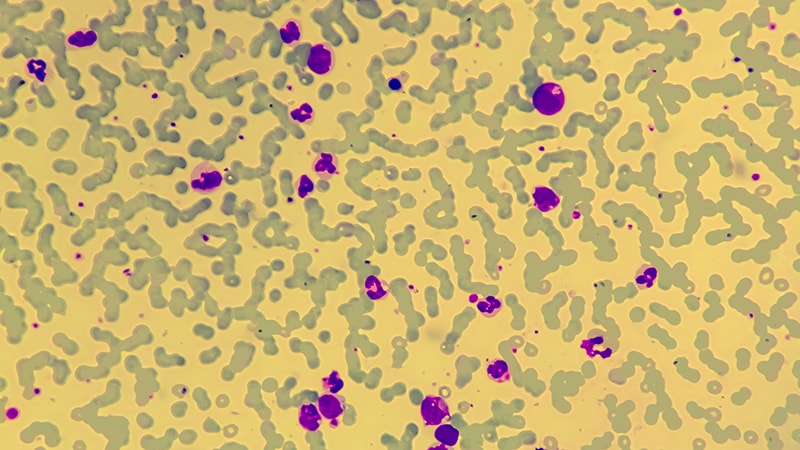Core Concepts
Lenzilumab shows promise in treating CMML.
Abstract
The content discusses the promising results of using lenzilumab, a GM-CSF inhibitor, in the treatment of chronic myelomonocytic leukemia (CMML). Here is a breakdown of the key points:
- CMML Treatment Challenges: CMML is a rare and aggressive malignancy with no standard care. Current treatments include azacitidine and hydroxurea.
- PREACH-M Trial: Investigating the combination of azacitidine and lenzilumab in CMML patients with RAS pathway mutations.
- Positive Results: Preliminary data from the trial showed reductions in monocyte counts, increases in platelet counts, and hemoglobin levels, along with reductions in spleen size and C-reactive protein levels.
- GM-CSF Inhibition: Lenzilumab targets GM-CSF, which has shown efficacy in patients with mutations in the RAS pathway.
- Future Implications: Researchers are optimistic about the potential of lenzilumab as a game-changer in CMML treatment.
Customize Summary
Rewrite with AI
Generate Citations
Translate Source
To Another Language
Generate MindMap
from source content
Visit Source
www.medscape.com
GM-CSF Inhibitor Lenzilumab Shows Early Promise in CMML
Stats
"Objective response rates of 40%–50%"
"Complete response rate of less than 20%"
"More than 90% of cases of CMML carry somatic mutations"
"46%–60% of cases having mutations in TET2"
"40% having mutations in KRAS, NRAS, or CBL"
"5.1-fold decrease in monocyte counts (P = .03)"
"2.4-fold decrease in blast counts (P = .04)"
"Significant increase in blood hemoglobin concentration (P = .024)"
"Significant reduction in spleen size (P = .03)"
Quotes
"It's [in the] early days, but if what we're seeing is durable across the next 10 patients then I think we're looking at a game changer.” - Daniel Thomas
"The biological idea that's being explored here in the clinic in this study is that by blocking, or starving if you will, those cells of that food, then you can prevent this overgrowth of certain blood cells that lead to chronic myelomonocytic leukemia.” - Cameron Durrant
Key Insights Distilled From
by Neil Osterwe... at www.medscape.com 06-19-2023
https://www.medscape.com/viewarticle/993375
Deeper Inquiries
How might the use of lenzilumab impact the current treatment landscape for CMML?
The use of lenzilumab in the treatment of CMML could potentially revolutionize the current treatment landscape for this rare malignancy. By targeting granulocyte-macrophage colony-stimulating factor (GM-CSF), lenzilumab offers a novel approach to treating CMML, especially in patients with mutations in the RAS pathway. The preliminary results from the phase 2/3 PREACH-M trial show promising outcomes, including durable decreases in monocyte counts, increases in platelet counts and hemoglobin levels, and reductions in spleen size and inflammatory markers. If these results are confirmed in further studies, lenzilumab could become a game-changer in the treatment of CMML, offering a more effective and targeted therapy option compared to current treatments like azacitidine or hydroxurea.
What potential challenges or limitations could arise from targeting GM-CSF in CMML treatment?
While targeting GM-CSF with lenzilumab shows great promise in the treatment of CMML, there are potential challenges and limitations that could arise. One challenge is the possibility of adverse events related to the treatment, as seen in the PREACH-M trial where some grade 3 or 4 adverse events were reported, with a few possibly related to lenzilumab. Additionally, the long-term effects and sustainability of the treatment need to be further studied to ensure its safety and efficacy over time. Another limitation could be the development of resistance to GM-CSF inhibition, which might reduce the effectiveness of lenzilumab in the long run. Furthermore, the cost and accessibility of this novel therapy could also pose challenges for widespread adoption in clinical practice.
How can the findings of this study contribute to the broader understanding of immunotherapy in hematologic malignancies?
The findings of the PREACH-M trial investigating lenzilumab in CMML patients with mutations in the RAS pathway can significantly contribute to the broader understanding of immunotherapy in hematologic malignancies. By targeting GM-CSF, this study sheds light on the potential of immunotherapy in treating hematologic malignancies, especially those with specific mutations that make them sensitive to GM-CSF inhibition. The positive outcomes observed in terms of decreased monocyte counts, increased platelet counts, and reductions in spleen size and inflammatory markers provide valuable insights into the mechanisms of action of lenzilumab and its impact on the tumor microenvironment. These findings could pave the way for further research and development of immunotherapeutic approaches in other hematologic malignancies, potentially expanding the treatment options available for patients in the future.
13
